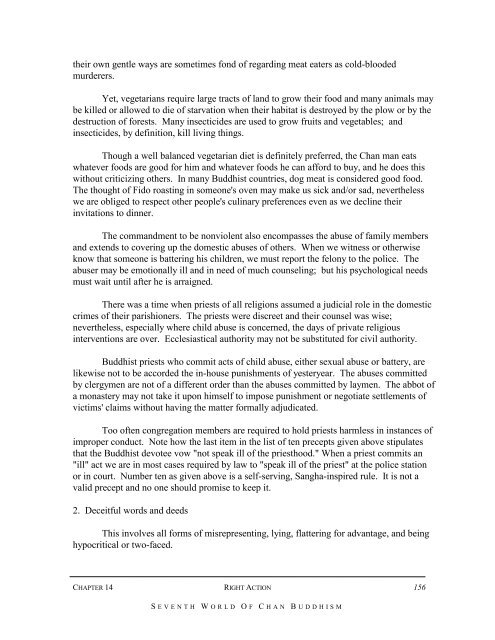seventh world of chan buddhism - Zen Buddhist Order of Hsu Yun
seventh world of chan buddhism - Zen Buddhist Order of Hsu Yun
seventh world of chan buddhism - Zen Buddhist Order of Hsu Yun
You also want an ePaper? Increase the reach of your titles
YUMPU automatically turns print PDFs into web optimized ePapers that Google loves.
their own gentle ways are sometimes fond <strong>of</strong> regarding meat eaters as cold-blooded<br />
murderers.<br />
Yet, vegetarians require large tracts <strong>of</strong> land to grow their food and many animals may<br />
be killed or allowed to die <strong>of</strong> starvation when their habitat is destroyed by the plow or by the<br />
destruction <strong>of</strong> forests. Many insecticides are used to grow fruits and vegetables; and<br />
insecticides, by definition, kill living things.<br />
Though a well balanced vegetarian diet is definitely preferred, the Chan man eats<br />
whatever foods are good for him and whatever foods he can afford to buy, and he does this<br />
without criticizing others. In many <strong>Buddhist</strong> countries, dog meat is considered good food.<br />
The thought <strong>of</strong> Fido roasting in someone's oven may make us sick and/or sad, nevertheless<br />
we are obliged to respect other people's culinary preferences even as we decline their<br />
invitations to dinner.<br />
The commandment to be nonviolent also encompasses the abuse <strong>of</strong> family members<br />
and extends to covering up the domestic abuses <strong>of</strong> others. When we witness or otherwise<br />
know that someone is battering his children, we must report the felony to the police. The<br />
abuser may be emotionally ill and in need <strong>of</strong> much counseling; but his psychological needs<br />
must wait until after he is arraigned.<br />
There was a time when priests <strong>of</strong> all religions assumed a judicial role in the domestic<br />
crimes <strong>of</strong> their parishioners. The priests were discreet and their counsel was wise;<br />
nevertheless, especially where child abuse is concerned, the days <strong>of</strong> private religious<br />
interventions are over. Ecclesiastical authority may not be substituted for civil authority.<br />
<strong>Buddhist</strong> priests who commit acts <strong>of</strong> child abuse, either sexual abuse or battery, are<br />
likewise not to be accorded the in-house punishments <strong>of</strong> yesteryear. The abuses committed<br />
by clergymen are not <strong>of</strong> a different order than the abuses committed by laymen. The abbot <strong>of</strong><br />
a monastery may not take it upon himself to impose punishment or negotiate settlements <strong>of</strong><br />
victims' claims without having the matter formally adjudicated.<br />
Too <strong>of</strong>ten congregation members are required to hold priests harmless in instances <strong>of</strong><br />
improper conduct. Note how the last item in the list <strong>of</strong> ten precepts given above stipulates<br />
that the <strong>Buddhist</strong> devotee vow "not speak ill <strong>of</strong> the priesthood." When a priest commits an<br />
"ill" act we are in most cases required by law to "speak ill <strong>of</strong> the priest" at the police station<br />
or in court. Number ten as given above is a self-serving, Sangha-inspired rule. It is not a<br />
valid precept and no one should promise to keep it.<br />
2. Deceitful words and deeds<br />
This involves all forms <strong>of</strong> misrepresenting, lying, flattering for advantage, and being<br />
hypocritical or two-faced.<br />
CHAPTER 14 RIGHT ACTION<br />
S EVENTH W ORLD O F C HAN B UDDHISM<br />
156


